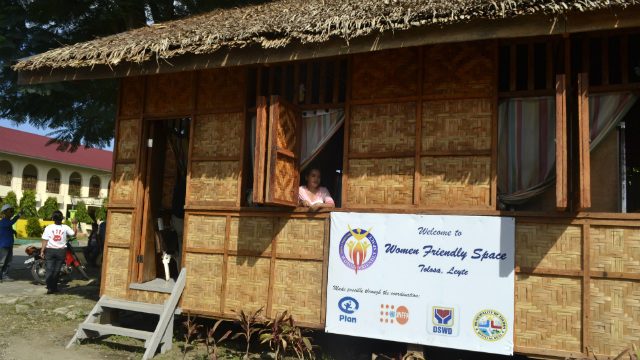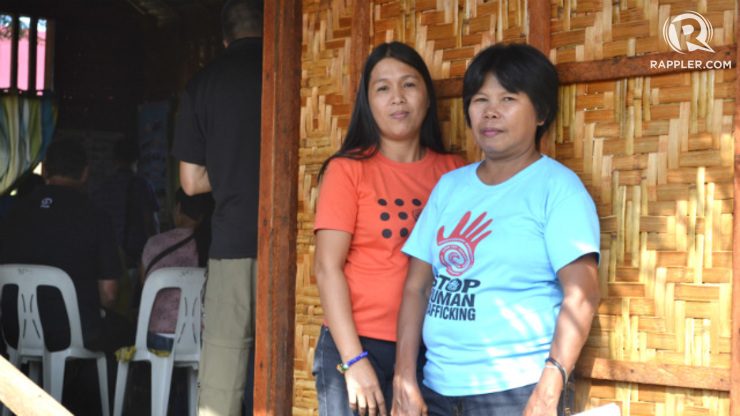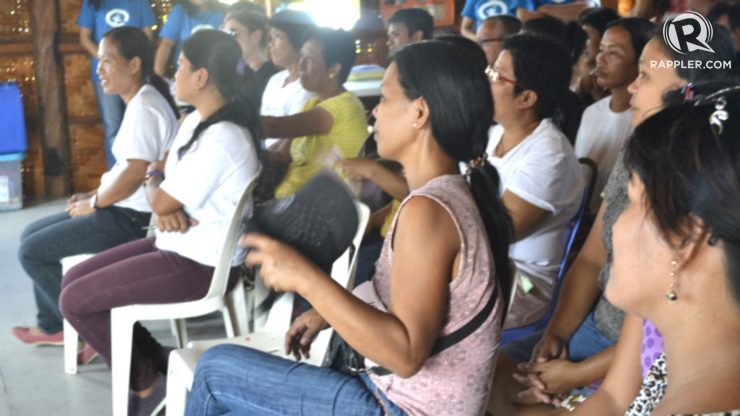SUMMARY
This is AI generated summarization, which may have errors. For context, always refer to the full article.

TACLOBAN CITY, Philippines – The women of Tolosa, Leyte, did not know what a storm surge was, not even how devastating Typhoon Yolanda (Haiyan) would be to the Visayan region.
They were, after all, used to weather disturbances but only in the form of strong winds and torrential rain – a far cry from what they experienced when one of the strongest recorded typhoons hit their community.
The family of Norma Suyon was saved by her son’s habit of staying up late to exchange messages with his textmates.
“Ginising ako bigla ng anak ko habang madaling araw,” she recalled. “Iyong textmate niya sa Maynila, sinabihan siya kung hindi ba kami lilipat kasi iyong bakuran namin maraming niyog at malapit sa dagat.”
(He woke me up during the wee hours because his textmate from Manila asked if we weren’t going to evacuate since we have a lot of coconut trees in our backyard and we’re near the sea.)
A feeling of dread washed over the 52-year-old mother. She knew then that they had to immediately find a safe place. But the family’s 14 children, a few grandchildren, and her husband all staying at one place was a disaster waiting to happen.
Norma’s older sons took care of the youngest children in the local chapel. They didn’t want their mother to be burdened, they said.
Meanwhile she and her husband stayed with the other children at the barangay center. The Suyon clan did not want to completely erase their family name off the surface of the planet.
“Naramdaman ko na sobrang malala po iyong mangyayari na kaya naghiwalay kami. Para maski anong mangyari, may matitira sa amin (I had a feeling that it was really going to be bad so we had to separate. In case something happened, some of us will still survive),” she told Rappler.
The way to the center was completely different from the days before November 8. Norma could not see anything, not even her husband and children.
The small hands that were firmly holding their mother’s arms were the only assurance she had that they were still together.
They heard screams and cries for help, but the strong wind made it hard for them to distinguish if the sounds came from actual people.
“Iyong ulan at hangin, naghahalo. Naisip ko kung iyon na ba ang katapusan namin. Naisip ko rin iyong iba kong mga anak (It was raining hard and there was a strong wind. I thought to myself, is this the end for us? I thought of my other children),” she recalled.

What they thought was a safe place was no match for the unforgiving wind that Yolanda blew into the Visayas, which ripped off the roof of the 10-year-old center just as the Suyons were about to enter the place.
For about 10 minutes, Norma said, the wind stopped howling. They were instructed to transfer to where her other children were. As the final evacuee stepped out of the center, the structure caved in.
God clearly had other plans for them, she said, for the debris that rescue workers sorted through in the days to come did not include their corpses.
Not the end
The calm did not last long, however. Unknown to their neighborhood, the first hour of Yolanda’s landfall was only the beginning.
Norma’s son, thinking it was already safe, decided to go back to their house to retrieve food for the starving and crying children. Less than 5 minutes later, he came running back to the center covered with mud and shouting, “Tubig! Tubig! (Water! Water!)”
“Nagsasalubong daw iyong tubig mula sa kanan at kaliwa kaya napagitna siya. Lumabas na raw kami at baka ma-trap kami at mamatay (He was caught in the middle of the rushing water coming from both sides. We had to leave because we’ll get trapped and die),” Norma said.
“Hindi gumagalaw iyong mga tao, nakatulala na. Parang wala na silang maisip na at siguro ito na ang katapusan namin.”
– Norma Suyon, 52-year-old mother of 14 and Yolanda survivor
The people inside the chapel – roughly more than a hundred – froze because of everything that was happening. It was as if they had already accepted their fate.
“Hindi gumagalaw iyong mga tao, nakatulala na. Parang wala na silang maisip na at siguro ito na ang katapusan namin (The people were not moving; just staring into space. It’s as if they cannot think of anything anymore and thought they were going to die),” Norma said.
Trying to move forward

The super typhoon claimed over 6,000 lives while a thousand are still missing. Norma and the rest of their neighbors weren’t part of them.
Their houses might have been completely destroyed – the Suyons had to stay for more than one month in an uncomfortable shelter – but they all survived and that’s what matters to them.
One year after Tyhoon Yolanda, the women of Tolosa do not cry anymore. They do not spend their early mornings and late nights asking why the good people of the Visayas, of the Philippines, had to go through the harrowing experience.
The various projects of humanitarian organizations in their area were a big help, Norma said. She and her friends take part in the activities of the women-friendly spaces (WFS) set up by PLAN International and the Department of Social Welfare and Development (DSWD).
“Mas mabuti ito kaysa nasa bahay lamang (This is better than staying at home),” she said.
The traumatic experience is lodged at the back of their minds like a dark secret.
But when they are forced to sleep on an empty stomach, their children have to go to school empty handed, and as they wait for the help promised by the national government, they are brought back to November 8, 2013. – Rappler.com
For Rappler’s full coverage of the 1st anniversary of Super Typhoon Yolanda (Haiyan), go to this page.
Add a comment
How does this make you feel?
There are no comments yet. Add your comment to start the conversation.